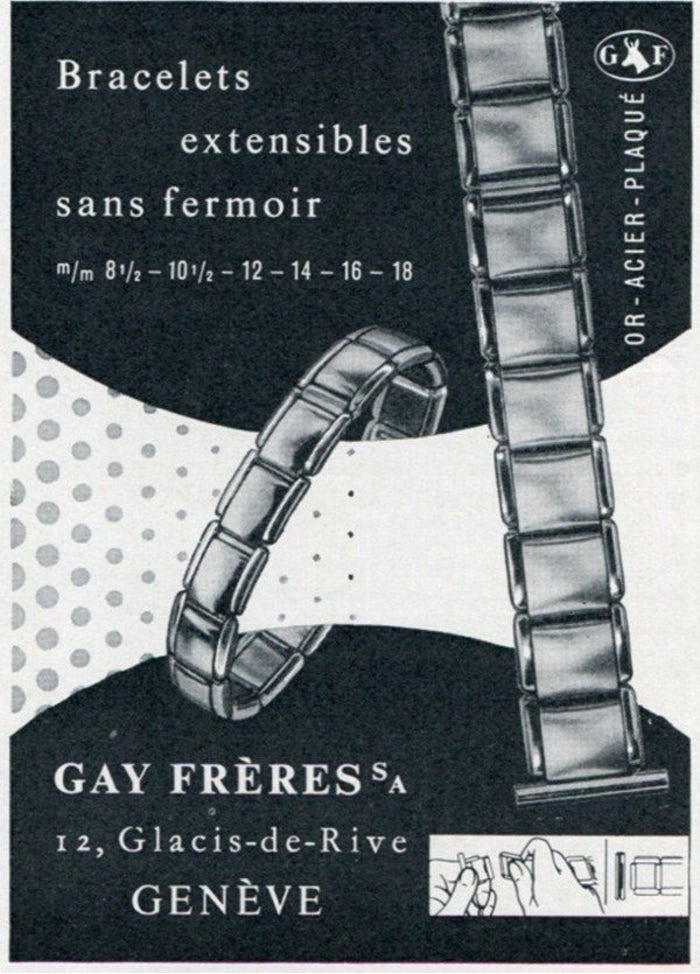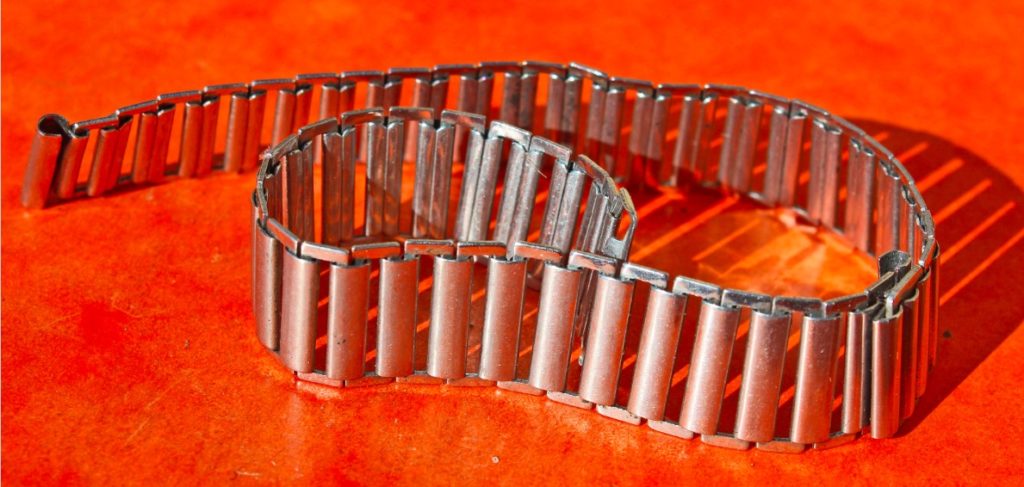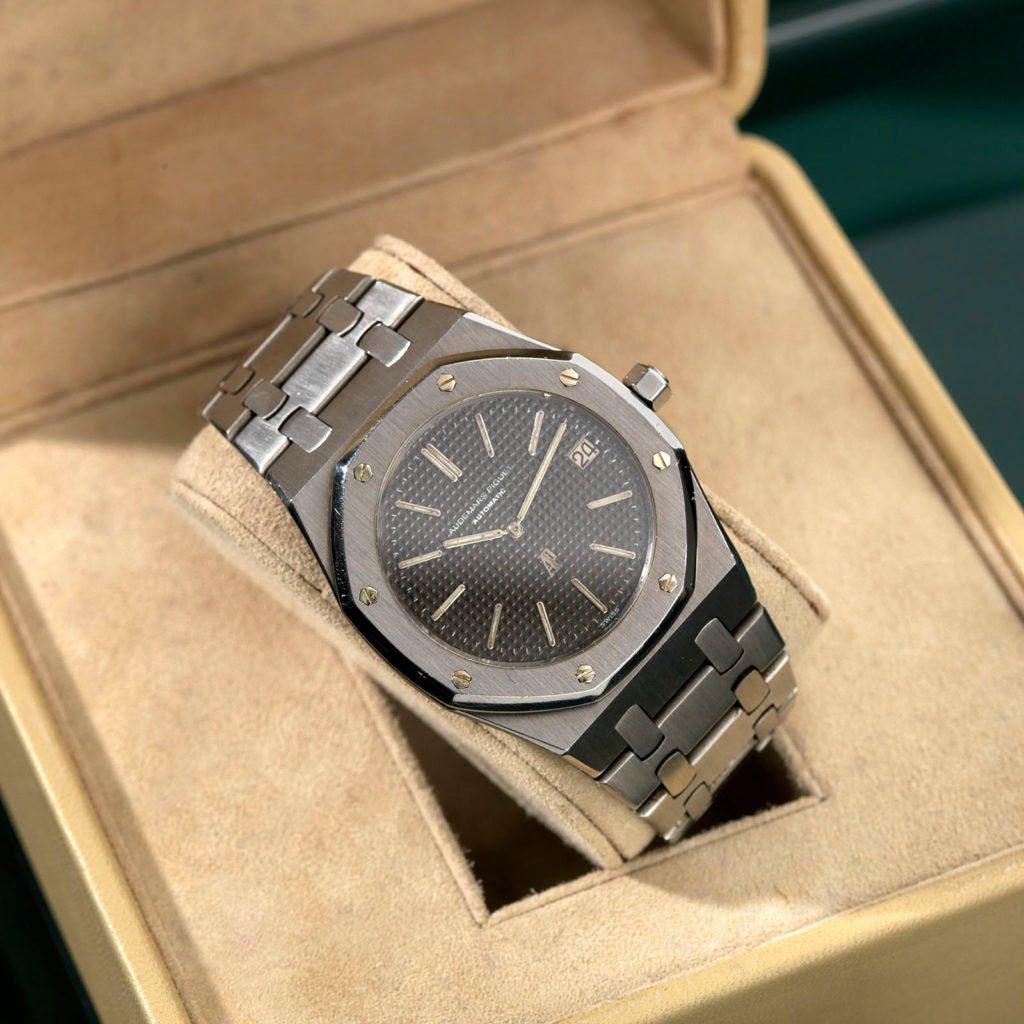
Gay Frères – The Bracelet Brothers
The story of Gay Frères begins in 1835 when, arguably, the world’s most important watch bracelet manufacturer was founded by Jean-Pierre Gay and Gaspard Tissot. They weren’t brothers but the business remained a strong family concern throughout its lifetime and was in fact being run by descendants of Jean-Pierre, brothers Jacques-Hubert and Jean-Francois Gay during the 1970s. As part of Rolex’s ‘industrial rationalisation’ in the 1990s, Gay Frères was bought by the manufacturer in 1998 and continues to operate producing bracelets. But watch bracelets weren’t always the brand’s most important output; jewellery has always been an important trademark of Gay Frères and especially very complex pieces in precious metals.

Chains and Links
The origins of the Gay Frères is essentially in pocket watch chains and jewellery. Whilst the horology-focused aspects are what make Gay Frères (GF) as famous as they are, the artisan jewellery that they made in the 1960s and 70s is some of the most sought after by collectors. As well as their own branded stuff they did and do also provide high-end work to houses such as Van Cleef & Arpels and Hermes. Their expertise in making complicated chains and cuffs was supplemented by outstanding craftsmanship in gem setting and working with ebony and ivory as well as enameling. The market for mid-20th century GF jewellery is strong and getting stronger.


The brand’s work as the leading light in watch bracelets began, as I mentioned earlier with pocket watch chains. Geneva, GF’s original home, was the world’s capital for high quality watch chains, but as the wristwatch became more popular a lot of the companies that had been focused on pocket watch chains didn’t adapt and were forced to shut down. GF had bigger and better ideas however.
Bonklips and Ladders

By the early 20th Century Gay Frères were well established as the leading lights of metal bracelet manufacturing in Geneva. One of their most famous creations was the Bonklip bracelet, which it delivered in very large numbers to Rolex during the 1930s. This wasn’t a technically very difficult bracelet to make, but it was versatile and hard wearing and was perfect for all applications, especially for watches destined for military use.

This utilitarian bracelet can be seen as an early iteration of the Oyster bracelet, which was designed by Gay Frères with Rolex and is still today one of both brands’ (Rolex and GF) most iconic and enduring creations. Alongside Rolex, GF also made bracelets for Patek Philippe, Omega, Heuer, Universal Geneve and Vacheron who all used GF to design and supply their bracelets. Another enduring classic that was a GF concept is the iconic Zenith ‘Ladder’ bracelet that graced the Zenith El-Primeros amongst other models.
Complex Creations
Gay Frères’ technical aptitude, which it had honed through its high-end jewellery manufacturing, positioned it as the go-to manufacturer for complex bracelets. With the advent of stainless steel watches, the big watch brands needed a company that could make the highest quality bracelets in steel. Working in steel is much harder than gold and requires technical know-how and the correct machinery. GF were ahead of any other bracelet company in this respect and so they were awarded many contracts with the leading watch brands.


The best example to illustrate this is the Audemars Piguet Royal Oak. There was no other factory able to build the extremely complicated bracelet that was a key element of the Royal Oak. Gay Frères were key to the manufacturing of the watch and making it the instant hit that it was. The same thing happened when Patek Philippe needed the bracelet realising for the Nautilus.

Beads of Rice
Whilst the development of the Oyster bracelet and the Royal Oak bands were key, perhaps GF’s most famous creation was the so-called ‘beads-of-rice’ bracelets. These bracelets are complicated to make and yet their execution is utterly timeless. Brands such as Patek and Vacheron used the bracelets extensively. How often have you seen an important watch sale catalogue filled with pages of eye-wateringly expensive complicated watches? I bet more than a few of the watches were fitted with original GF beads-of-rice bracelets. They were as at home on a Patek perpetual calendar moonphse watch as they were on a simple time-only Calatrava.



Omega and Longines also made good use of the bracelet during the 1950s and 60s. That’s the beauty if timeless design; it works anywhere. One of the key element of the beads-of-rice design is the straight endlink. Also used pre-1954 on Oyster and Jubilee bracelets before the introduction of the flush-fit endlink, the straight endlink is now regarded as a key vintage aesthetic, especially in stainless steel. In fact, we think they look so good that we have our very own range of modern interpretations that we have for sale here.


Vintage Gay Frères at Bulang and Sons

We love to offer you all unique and cool vintage finds and we are so pleased to have found a couple of amazing vintage GF bracelets that we are offering in our store.


The workmanship of these bracelets is beautiful and highlights the craftsmanship that was evident in the brand back in that era. The integrated straight endlinks measure 20mm across on both bracelets and remain in beautiful condition. Either or both of these bracelets would be the dream companion for your treasured vintage steel watch. Pair it up and keep the tradition alive!







